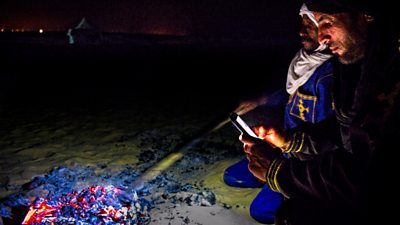Research summary
Published: July 2021
The spread of information that is false or misleading – whether by word-of-mouth, media, or otherwise – is an age-old phenomenon. Yet advances in technology, increasing access to both traditional and social media and changes in how people interact with information are propelling the spread of false information at a speed and scale not seen before. This has resulted in information ecosystems that are dangerously affected by information disorder, including mis- and disinformation.
In Libya, a rapid rise in use of social media coincided with the collapse of the Gaddafi government and the First Libyan civil war in 2011. This rise has continued throughout subsequent years and conflict, including the second civil war, and there are now over four million Facebook users in the country (over two thirds of the population). Various actors in the conflict, including politicians, armed groups, and foreign parties, have used social media to push their versions of the truth, discredit their enemies and create positive narratives for their own agendas . This has included the creation and spread of disinformation campaigns.
More recently and like many countries, Libya has witnessed a proliferation of false and misleading information about the COVID-19 pandemic (e.g., on its origin, symptoms, how it transmits, what can help to prevent its spread, and the safety and efficacy of vaccines) as people struggle to know who and what to trust in what the WHO has labelled an ‘infodemic’.
Key findings
The prevalence of false or misleading information on social media in Libya is evident, with 96% of survey respondents reporting having encountered it at some point, and 59% believing they encounter it at least weekly.
Libyans are highly concerned about the level of false and misleading information on social media (80% agree or strongly agree they are concerned), and the harmful effect it has on people in Libya (89%).
However many respondents don’t feel personally susceptible to it. Respondents reported a sense of confidence in their ability to assess and identify the accuracy of information they see and share online - a total of 78% of Libyans said they felt a least ‘somewhat confident’ in their ability to identify false or misleading information. Despite this, over a third (38%) of respondents reported having previously shared information that turned out to be false. This apparent over-confidence was particularly prevalent among those respondents who are the most prolific users of social media, and among those who reported sharing social media content frequently.
Sharing of information on social media is largely driven by a sense of altruism and socialisation (e.g. wanting to ‘join in’ with an online community), rather than self-promotion, and respondents largely reported avoiding sharing anything that they feel might cause harm or conflict.
Respondents mostly reported that they value accurate, trustworthy information (73% ‘agree’ or ‘strongly agree’ that they do). They were, however, less likely to feel that they could actually access accurate information in practice (62%) and they reported being wary of the accuracy of online news and information.
Trust is a key variable in social media information flow, and people tend to trust information online when it is shared by trusted friends and family whom they believe would not pass on false or misleading information. There is also a widely held belief in the ‘power of shares’ – i.e., that the more widely a piece of information is shared online, the more people are willing to believe it.
Sometimes an initial reading of a post does not give you the true meaning, and then you realise later that you have shared it and it is not good.”
Research methodology
The study took place in March and April 2021. The research consisted of desk review of relevant literature, 36 in-depth interviews and a national representative telephone survey with men and women aged 18 and above (1483 Respondents). The qualitative research included specific exploration of how participants engaged with several examples of false and misleading information in relation to the COVID-19 pandemic.
Key implications
The research suggests a number of potential implications for future work on information disorder in Libya, including:
- As the country moves towards the planned national election and rolls out its COVID-19 vaccines, ���˿��� Media Action’s El Kul can play a role in providing independent, accurate and trusted information in the Libyan eco-system.
- ���˿��� Media Action’s El Kul can also provide targeted signposting to direct them towards the reputable sources of information on these themes and other sensitive topics.
- Social media users also need sensitive support to help them recognise their own vulnerabilities, and they need better media literacy skills and confidence to help them identify false and misleading information.
- Social media users are primarily driven to share information which they feel can help others. This motivation could be tapped into when designing media literacy interventions, for example by emphasising the importance of only sharing information one really knows is accurate if one is trying to be helpful or kind to others.
Learn more about our work in the Middle East and North Africa here.
